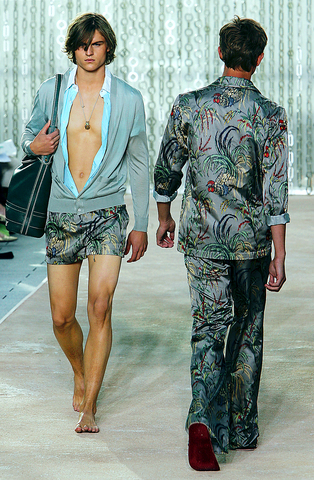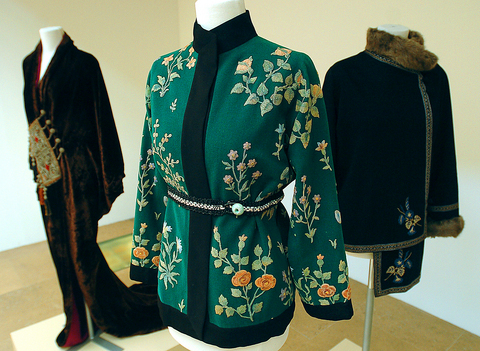Kathy Taslitz, a Chicago decorator, is wired with a fashion instinct that functions as efficiently as a satellite homing device. In late January, only days after Azzedine Alaia had presented samples from his fall collection in Paris, Taslitz zeroed in on a sumptuous black suede peplum coat, which she had seen in a photograph. She called her favorite boutique and placed an order, even though the US$7,345 coat would not be available for more than six months.
"When I see something I love, I don't have to think about it," Taslitz explained. "I go to work on it right away. If not, it's lost."
Dr Lisa Airan, a dermatologist in Manhattan, has likewise learned to trust her eye. "I have a good sense of line, proportion and texture," she said. That and a sense of urgency prompted her to pop into the Marc Jacobs boutique on Bleecker Street last month and put her money, US$1,700, on an abbreviated peacoat weeks before it was due to arrive in the store. "When you work the hours that I do," Airan said, "you don't have a lot of time to shop, so you move in fast."

PHOTOS: AP
Taslitz and Airan are members of a steely cohort of like-minded shoppers: hyper-informed about what's coming next in fashion, largely affluent, driven by the same competitive fever that makes Broadway fans spring for hot tickets even before the actors have learned their lines. Adept in the rituals of getting and spending, they close in on -- and pay for -- the season's most coveted runway items at a time when other less zealous shoppers have registered them only as a speck on the fashion horizon. Their numbers are small, representing no more than 2 percent of the shopping population, according to Pamela Danziger, an authority on the spending habits of affluent consumers, but their choices are often reliable indicators of fashion's direction in the months ahead.
"It's all about reserves today -- placing orders ahead of the selling season on items that we might have asked for in limited quantities and sizes," said Wayne Mahler, the fashion coordinator of Linda Dresner, a specialty boutique in Manhattan and Birmingham, Mich. "They see those items on the Internet or in magazines, and what they see is what they want."
Topping the most-wanted lists of early shoppers this season are catwalk hits like a slim, sashed trench coat from Lanvin, a military-detailed jacket and vented chiffon skirt at Balenciaga and a cropped red leather jacket by Dsquared: each item an expression of a trend to refined tailoring beginning to filter into the wider marketplace. Fur-collared, embroidered pieces from Dries van Noten; a wildly zigzagging knit dress and striped beret at Missoni; crystal and paste necklaces entwined with ribbon at Lanvin; and even oddities like copper-tinted python boots by Devi Kroell -- flat boots are in high demand this fall -- and high-heeled platform loafers from Yves Saint Laurent attest to an increasingly popular taste for opulent or idiosyncratic designs.

Retailers like Mahler say the tendency to close in swiftly on such items has escalated in the last 18 months. "Nowadays customers start placing their orders so quickly that the clothes may never reach the selling floor," he said. That practice, known in retail parlance as the pre-buy, in which consumers pay full retail price for the coming season's wares, is
proving salutary.
"It's certainly a boon to the luxury business," said Dana Telsey, a luxury goods analyst with Bear Stearns in New York.

PHOTO: AFP
Consumers are aware that the most
sought-after items have likely been ordered
in limited quantities, she noted. "That

PHOTOS: AP
exclusivity has made more people willing to pay full price for merchandise the moment they think they can get it, which has helped the bottom line."
Some merchants view the trend as a mixed blessing: Because customers are picking clothes even before a store may have ordered them, retailers' authority as style arbiters may be eroded; but the early orders also are a cushion, limiting the risk that high-ticket items will languish on the racks. "It's great to know that certain pieces are spoken for," said Jeffrey Kalinsky, the owner of Jeffrey, a fashion boutique in New York and Atlanta.
Beth Buccini, a partner in Kirna Zabete in Manhattan, welcomes shoppers who rush the selling season. "You feel their frenzy," she said. "You feel it in the bottom line." Buccini attributes a 27 percent spike in the sales over the same period a year ago to her pre-buy business.
An accelerated fall selling cycle, which kicks off as early as February, just after the fall collections are shown, also lends an element of edge to shopping that wasn't there before.

On April 26, The Lancet published a letter from two doctors at Taichung-based China Medical University Hospital (CMUH) warning that “Taiwan’s Health Care System is on the Brink of Collapse.” The authors said that “Years of policy inaction and mismanagement of resources have led to the National Health Insurance system operating under unsustainable conditions.” The pushback was immediate. Errors in the paper were quickly identified and publicized, to discredit the authors (the hospital apologized). CNA reported that CMUH said the letter described Taiwan in 2021 as having 62 nurses per 10,000 people, when the correct number was 78 nurses per 10,000

As we live longer, our risk of cognitive impairment is increasing. How can we delay the onset of symptoms? Do we have to give up every indulgence or can small changes make a difference? We asked neurologists for tips on how to keep our brains healthy for life. TAKE CARE OF YOUR HEALTH “All of the sensible things that apply to bodily health apply to brain health,” says Suzanne O’Sullivan, a consultant in neurology at the National Hospital for Neurology and Neurosurgery in London, and the author of The Age of Diagnosis. “When you’re 20, you can get away with absolute

May 5 to May 11 What started out as friction between Taiwanese students at Taichung First High School and a Japanese head cook escalated dramatically over the first two weeks of May 1927. It began on April 30 when the cook’s wife knew that lotus starch used in that night’s dinner had rat feces in it, but failed to inform staff until the meal was already prepared. The students believed that her silence was intentional, and filed a complaint. The school’s Japanese administrators sided with the cook’s family, dismissing the students as troublemakers and clamping down on their freedoms — with

As Donald Trump’s executive order in March led to the shuttering of Voice of America (VOA) — the global broadcaster whose roots date back to the fight against Nazi propaganda — he quickly attracted support from figures not used to aligning themselves with any US administration. Trump had ordered the US Agency for Global Media, the federal agency that funds VOA and other groups promoting independent journalism overseas, to be “eliminated to the maximum extent consistent with applicable law.” The decision suddenly halted programming in 49 languages to more than 425 million people. In Moscow, Margarita Simonyan, the hardline editor-in-chief of the